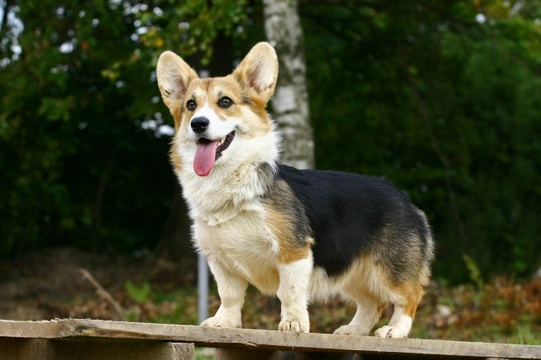Pets
Pets for studWanted petsBreedersAccessories & services
Knowledge hub
Support
Support & safety portal
Pembroke Welsh corgi hereditary health and longevity
The Pembroke Welsh corgi is one of two corgi breeds that of course, both originate from Wales. While the two breeds (the Pembroke and the Cardigan respectively) are often simply grouped under the same heading of “Corgi,” the two types are actually recognised as separate, individual breeds, despite their many commonalities.
The Pembroke Welsh corgi is the more common of the two types, but nevertheless, they are not as popular today as they have been historically, and the Pembroke makes The Kennel Club’s list of vulnerable native breeds: Dog breeds that originate from the UK and Ireland, and for which less than 300 new puppies are registered each year.
The Pembroke Welsh corgi was historically used as a herding, working dog in Wales, but they later enjoyed great popularity as pets, in large part thanks to the fact that the Queen is a big corgi fan and owns several Pembrokes!
The Pembroke Welsh corgi is thought to be closely related to not only the Cardigan breed, but also the Finnish spitz dog, Schipperke, and several other breeds too.
If you have fallen for the undeniable charms of these small, compact and lively little dogs and are considering taking on ownership of one, it is important to do plenty of research into the breed first. This includes finding out about the general health and any health problems associated with the breed, which we will cover in more detail within this article.
Pembroke Welsh corgi longevity
The average lifespan of the Pembroke Welsh corgi is 12-15 years, which reflects an average to high lifespan when compared to other breeds of a similar size and build. Their working history tends to mean that the Pembroke is a fit, active and lively little dog, which is relatively hardy, despite their small statures.
Genetic diversity
The coefficient of inbreeding statistic for the Pembroke Welsh corgi is 8.9%, which is higher than the 6.25% or lower that is considered to be the ideal for pedigree dog breeds. This indicates that the Pembroke Welsh corgi is subjected to a reasonable degree of inbreeding and back crossing in order to keep the breed viable in perpetuity, and given the small number of dogs of the breed registered each year, this is in some cases necessary to ensure the future of the breed line.
However, breeders are advised to reduce the coefficient of inbreeding figure for their own breed lines where possible, in order to ensure healthy, genetically diverse litters.
Conformation
The Pembroke Welsh corgi is low to the ground, with disproportionately short legs compared to the length of their bodies. This is caused by a form of dwarfism called chondrodysplasia, which makes the leg bones abnormally short and slightly curved. This is a breed trait of the corgi, but is not strictly “normal” in evolutionary terms, and may potentially lead to problems with the legs and spine.
Health testing for the Pembroke Welsh corgi
The Kennel Club and the British Veterinary Association monitors the hereditary health of all pedigree dog breeds, in order to ascertain if any breed-specific health issues become prevalent within the breed, and work to reduce their impact. This means that in some cases, health testing prior to breeding is advised by the relevant organisations, and for the Pembroke Welsh corgi, the following tests are advised:
- Hip score testing, with the breed’s mean hip score being 24. This is a very high figure for any breed, and potential parent dogs of the breed should receive a hip score much lower than this to be considered as viable, healthy candidates for breeding.
- Eye testing for multifocal retinal dysplasia.
- DNA testing for SCID, or severe combined immunodeficiency syndrome.
- DNA testing for Von Willebrand’s disease.
- DNA testing for CDRM, degenerative myelopathy of the spinal cord.
- DNA testing for EIC, or exercise-induced collapse.
Other health issues
As well as the health issues mentioned above, that are known to be hereditary and are classed as a risk to the breed as a whole, the following conditions are also apt to present within the Pembroke Welsh corgi breed with a higher than usual incidence rate of occurrence.
These are conditions that cannot be definitively identified prior to breeding by means of health testing, but finding out about the health of the parent dogs of the line can help would-be buyers to make an informed decision.
- Cataracts of the eyes, particularly in old age.
- Intervertebral disc disease, a condition of the spine and back.
- Urolithiasis, a propensity to develop crystals and stones in the bladder and urinary system.
- Lens luxation of the eyes.
- Haemophilia, a clotting disorder of the blood that can lead to problems with injuries and wound healing.
- A heart condition called patent ductus arteriosus, a type of heart disease that can lead to the shunting of blood away from the lungs.



